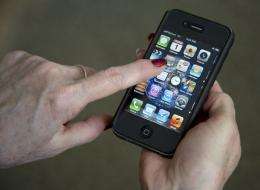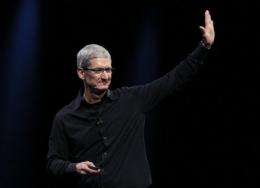Coming upgrades to the software that powers Apple's hot-selling iPhones reveal a strategy to keep users in Apple's "walled garden" as smartphones become essential components of day-to-day life.
Apple is mapping a path to the throne of the Internet age mobile lifestyle.
Coming upgrades to the software that powers its hot-selling iPhones reveal a strategy to keep users in Apple's "walled garden" as smartphones become essential components of day-to-day life.
A centerpiece of the plan was booting Google Maps from iOS software powering Apple iPhones, iPads, and iPod Touch devices and replacing it with a custom-made mapping service.
The move announced on Monday is not only another shot in the ongoing battle between the California technology titans, but lays groundwork for Apple to take on its arch rival in areas such as search and smartphone "digital wallets."
"Location-based services, maps, are a key strategic asset in the mobile services arena," NPD analyst Ross Rubin said Tuesday.
Delivering iPhone services based on locations, and in the context of what users might be doing at the time, was a major theme during the presentation that kicked off Apple's annual Worldwide Developers Conference this week.
People could get spoken turn-by-turn directions from the Siri personal assistant technology or signal an iPhone to let a caller know they were in a meeting, and remind them to return the call after they leave the room.
Siri in iPhones will find nearby restaurants or movie theaters, weaving in reviews from customer-feedback websites Yelp or Rotten Tomatoes and even letting people buy film tickets from Fandango.
"I think Apple recognizes how important that experience is to a mobile device," Creative Strategies principal analyst Ben Bajarin said of tying smartphone services to people's locations.
"Apple wants to own that experience," he continued. "They brought it into their walled garden in a very useful way."
Apple controlling everything from the hardware to the software on its gadgets is referred to as a "walled garden" with the California company acting as vigilant overseer.
"With Apple's platform now set to leverage advancements in location determination technologies, the opportunity for compelling, commercial location-based services has never been more attractive," said Frost & Sullivan global research director Brent Iadarola.
Apple had sold more than 365 million mobile devices by the end of March, according to senior vice president of iOS software Scott Forstall.
Next-generation iOS 6 to be released later this year features more than 200 enhancements including Siri getting smarter about nearby restaurants, films, sports teams and more, Forstall said.
Analysts believed that a "sleeper feature" could be Passbook, which gives iPhone users a place to digitally store coupons, customer reward card information, film tickets or airline flight boarding passes.
Apple CEO Tim Cook, pictured on June 11, said "Apple sees the entire chain of commerce -- picking something out, finding an outlet, after sales enticements for accessories -- is a very rich opportunity. Pun intended in terms of revenue opportunity for Apple."
Bar or QR codes displayed on iPhone screens can be scanned at checkouts or checkpoints. Passbook synchs with location.
For example, Passbook would pop loyalty card information to the iPhone lock screen if a user was near a shop that they frequent.
"Anybody else calls that a digital wallet," said Forrester analyst Charles Golvin.
"It is clear that apple put a bull's-eye on that, and that means the next iPhone will have NFC (near-field communication) or physical payment capabilities," he continued.
The road ahead for Passbook likely includes ability to pay for real-world transactions with credit or debit cards or through iTunes accounts, according to Golvin.
There are more than 400 million iTunes accounts, complete with credit cards on file, according to Apple chief executive Tim Cook.
"Apple sees the entire chain of commerce -- picking something out, finding an outlet, after sales enticements for accessories -- is a very rich opportunity," he said. "Pun intended in terms of revenue opportunity for Apple."
Google built NFC technology into its Android-powered smartphones to let people use handsets as digital wallets.
"It looks like Apple is aggressively out to displace Google on all fronts," said independent Silicon Valley analyst Rob Enderle.
"We are starting to see the emergence of Tim Cook's Apple," he said of the successor to the company's legendary co-founder Steve Jobs, who died last year.
Cook is apparently approaching the market competition in terms of applications, content and other components being an "ecosystem" instead of just focusing on making hot-selling devices such as the iPhone, Enderle.said.
Apple is shoring up its iOS to offset features or services offered in handsets by competitors such as Google or Microsoft so the rivals don't "work around them and take away their customers," the analyst said.
Apple has targeted Google as not only a competitor but an enemy, filing civil suits in an array of countries charging that Apple innovations have been used in Android operating system for smartphones and tablet computers.
Apple is integrating leading social network and fellow Google adversary Facebook into its iPhone platform and even into the iTunes online shop, where people will be able to show friends what they "Like."
"There is some element of the enemy or my enemy being my friend," Rubin said of Apple cozying up to Facebook to enhance iOS 6 with social features to complete the Silicon Valley holy triad of "social-local-mobile."
(c) 2012 AFP
























